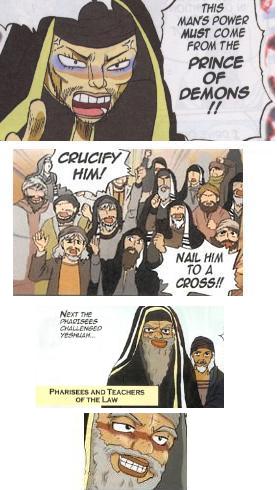
In June, the Modesto Bee ran a piece on Manga adaptations of the Bible, including a book called Manga Messiah. The article quoted a disturbing assessment from Deborah Shamoon, specialist in Japanese popular culture at Notre Dame:
As for the artwork, “Manga Messiah” has the most recognizable manga traits, but Shamoon said: “While there is no one way to draw manga, and there are many styles and genres in Japan, it’s a lot more than just characters with big eyes and pointy hair — a lot of what makes manga distinctive has to do with pacing and transitions between the panels.” While Jesus and his disciples have that cute manga-character look, the Pharisees — members of a fundamentalist Jewish sect with whom Jesus, a fellow Jew, was often at odds — are depicted in “Manga Messiah” with bigger noses, jowly jaws, squinty eyes and spotty complexions. “I think the representation of Jews is appalling,” Shamoon said.
On the other hand, a Manga expert named Jason Thompson was of the view that:
“I don’t think this is anti-Semitism, it’s just the standard manga stereotype that minor evil characters look ugly (or in the case of Judas, they look like androgynous bishonen with feminine features and earrings). It reflects a lack of originality and skill by the artist, not an ethnic or religious prejudice.”
Of course, Thompson’s perspective may tell us something about the artist’s intent, but that still leaves the context of the images – and the way readers are likely to understand them.
Either way, despite the controversy the Manga Messiah has been adopted enthusiastically by evangelical groups, as Bruce Wilson notes on Talk to Action (where the above images are reproduced, along with others):
Japanese readers first encountered the product when volunteers for Operation Mobilisation, dressed as elves and santas, handed out free copies of the 300-page Bible comic tract in a shopping district.
When Manga Messiah proved less popular among Japanese than anticipated, the product was re-conceived as a tool for global evangelizing and now is being translated, reportedly, into as many as 20 world languages. The Manga comic was introduced to the United Kingdom and the Philippines in 2006 and to the United States in 2007 and North Americans can purchase subsidized carton-sized lots of the anti-Jewish New Testament tracts from the Bible League of Canada.
One million copies of Manga Messiah are also being distributed with the official sanction of the Government of Uganda, with the express consent of Uganda’s First Lady Janet Museveni, a born again Christian and friend to Rick and Kay Warren. Under another of Warren’s Ugandan allies, Archbishop Henry Orombi, the Church of Uganda plans to give out ten million abbreviated versions of the comic…
There are translations in Tagalog, Indonesian, Norwegian, Danish, Portuguese, Spanish and French.
In 1988 the US Roman Catholic Bishops’ Committee for Ecumenical and Interreligious Affairs issued a “Criteria for the Evaluation of Dramatizations of the Passion” which warns against “Caricatures and False Oppositions” in re-telling the story of Jesus. One wonders how the Manga Messiah measures up against its sensible recommendations.
Filed under: Uncategorized | 6 Comments »


